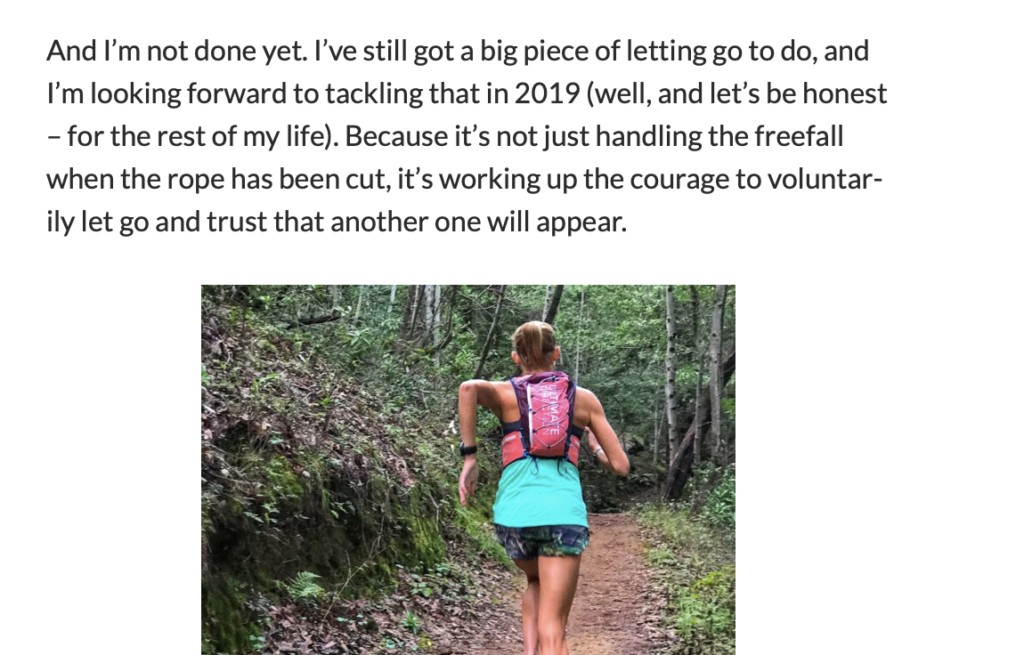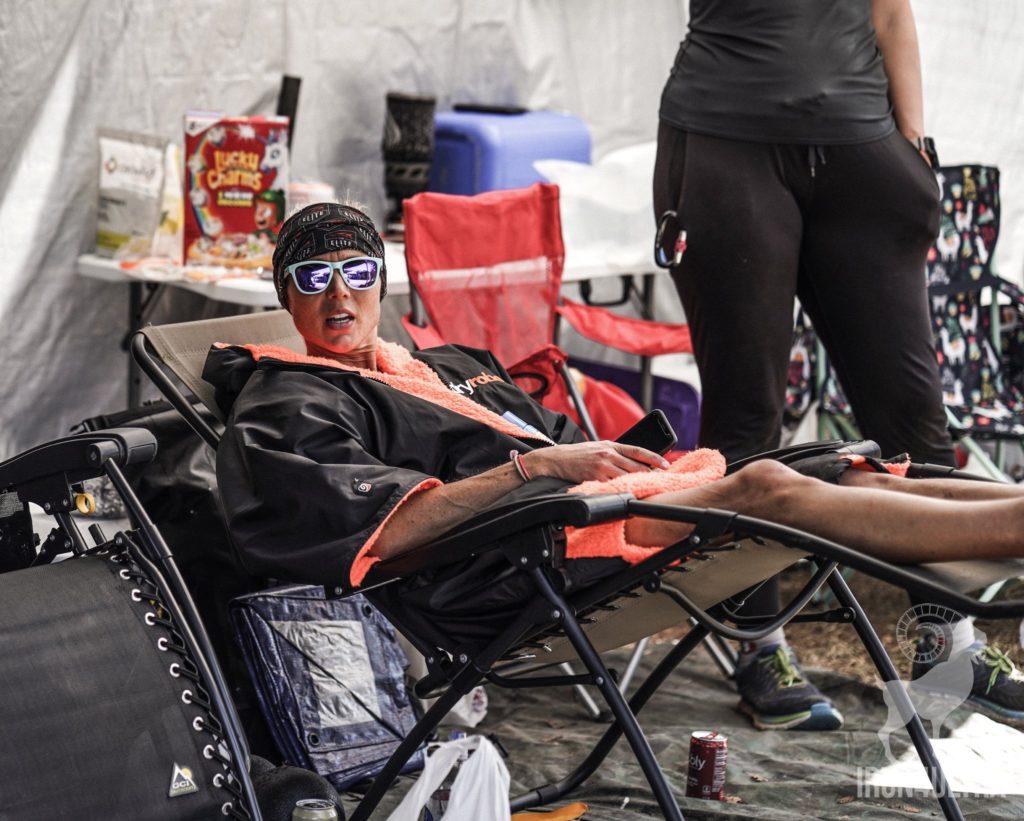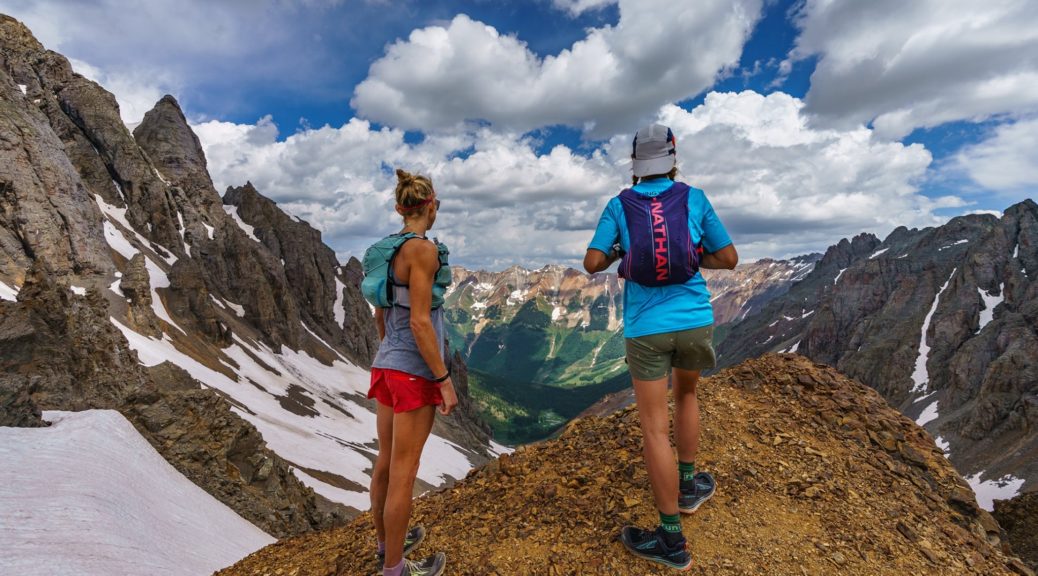On paper, 2019 probably looks like a rough year for me.
Fractured calcaneus two weeks before the Barkley Marathons (making that four stress fractures in three years)? Check.
Spent three months in an eating disorder treatment facility? Check.
DNF’ed both Big’s Backyard Ultra and World’s Toughest Mudder? Check.
Still didn’t land that Pop-Tarts sponsorship? Cheeeeeck.
Thankfully, paper lies. Because despite all of that, I will forever look back on 2019 as one of the best years of my life, and that has nothing to do with running. Was it terrifying, extremely hard, and humbling as shit? Absolutely.
But it’s also the first time in 20 years that I finally feel like me. Where I feel like what I put out externally matches up to how I feel internally. And where I finally felt like I was able to start to live again.
Without fear.
Without apprehension.
Without preconceived notions of what I “should” be or “should” do.
And that’s a beautiful, beautiful thing. For me, 2019 was a year of rebirth.
Over Christmas last year, I was in Palm Springs for a gathering of my extended family. Surrounded by people I love, it should have been a joyous occasion. And I wanted it to be that more than anything. As all my cousins gathered, joked, drank, ate, and played pickleball and board games, I isolated, shut down, and cried non-stop. I was frustrated by a fully fractured second metatarsal that still wasn’t healing after 3 months, and I spent every waking moment obsessing and worrying over food. I was paralyzed, unable to participate in life, and didn’t know what to do.
Through the midst of one teary fit, I told my parents and sister that something had to give. And I remember spending the time between Christmas and New Year’s calling multiple eating disorder treatment facilities. I reread my 2018 year-end reflections the other day, and to my surprise:

Honestly, I was in a such a low state at the end of 2018, I don’t even remember foreshadowing all of this. But I had already set the wheels in motions, and I knew what needed to be done. So perhaps by throwing that cryptic message in there, I was fortifying myself for the leap of faith that was required to make a change.
And hot damn, I’m so grateful I did. 2019 was a year of learning for me, a year of growth. And while the learnings will last a lifetime, a few things stood out to me:
You don’t have to know “why” to move forward
There’s a lot of focus in life on “why”: why do we race, why do we push ourselves, why are we the way we are. In the mental health space, it’s especially prevalent – find the reasons WHY you have a diagnosable mental illness, and POOF – you can magically get better.
I’ve spent 20 years trying to understand why I’ve battled anorexia. I’ve had therapist after therapist ask me about my family, my background, etc. But the truth is that I had a wonderful upbringing, as free as possible from diet culture. I was always in a smaller body my entire life, and never faced external pressure to lose weight. I never experienced body shaming (well, until I started being in magazines and winning races). Yet, I still have an eating disorder.
I’ll be honest: there are times when I’ve wished that I had an external place to lay the blame – something to point at and say “you: you are why I developed an eating disorder” (or “this thing” is the reason). I imagined that if I had something else to blame, I would stop blaming myself so much.
But I know that’s not the case: those people who battle mental illness who did face external pressures still lay blame on themselves. Those why can pinpoint a reason why are not necessarily magically able to recover faster.
So I’ve stopped trying to find that “why.” While finding the reasons may be useful, it’s not necessary. I’ve accepted that this is how I ended up, and I can still move forward and heal regardless.
Live in a state of constant curiosity
Of all the therapy and work I’ve done this year, the one central tenet that has been incredibly useful for me to heal is this: be curious. Watch when feelings and emotions arise. Note “that’s interesting.” When things get difficult, or when you have an intense reaction to something, explore that feeling. Lean into it without judgment (that whole “without judgment” part is the hardest aspect).
For me, curiosity came in the most handy as I explored my relationship with running, movement and sport, especially in learning how (if at all) it tied into my eating disorder. I used curiosity to explore different forms of movement (open-water swimming, biking, yoga, etc) to see how different forms of movement made me feel. To explore what came up for me when I was injured and couldn’t move how I’d like to, and how, if at all, it was tied to food anxiety and fears. And I’m grateful that Opal Food & Body encouraged our curiosity, as it’s highly individualized for each person.
I continue to use curiosity on a daily basis to journal about difficult feelings that arise: noting, observing, and not judging. And while I didn’t expect it, curiosity was HUGE in the little racing that I did do this year, namely…
You don’t have to aim to win every race
I went into Bigs Backyard this year only putting in 30-40 miles per week. I went into World’s Toughest Mudder not having touched an obstacle course for over a year. I ran a trail championship 10k having done ZERO speed work and knowing my leg speed was nowhere near that of the other women. And while there was a lot of ego swallowing involved in all of those, each experience was incredibly meaningful, independent of the results. I needed Bigs to start rebuilding confidence in my body. I needed World’s Toughest Mudder to come home to a family I missed so dearly. I didn’t need or want results from those races. I needed and wanted feelings. A few years ago, I would never go into a race knowing that I wasn’t there to compete for the win. I’d never go into a race knowing that I was likely going to pull the plug at some point. I’m still not quite sure it sits right with me, but it was fascinating to me to see what comes up in those moments and those situations.

And the most fascinating part? Aside from a few days of some minor regrets about Bigs, DNF’ing caused me very little anguish. In fact, the 12 hours after I stopped at WTM were probably the most fulfilling 12 hours of my year: helping others, giving hugs, hanging out in the pit.
I spent years afraid to lose. I then swung the other way and quashed all competitive spirit. I feel like the pendulum is finally settling in the middle: I’ll always want to compete, and I’ll always have that fire, but I’m recognizing that it doesn’t have to be in the traditional sense that we always think of (in terms of results on paper). And that it’s ok to simply go into a race for the love, the joy, and the experience.
Find what works for you: there are always trade-offs
I’ve been encouraged by how many people are speaking up about mental health now and their own battles. It’s given me courage and strength, and I hope to always pay that forward. At the same time, you don’t HAVE to “air your dirty laundry,” as I like to joke. For some people, it feels much more comfortable to keep things close to your chest. I will be the first to say that there is a downside to letting the entire world into your deepest, darkest secrets. I personally weighed the pros and cons at length. For me, it felt right to be an open book. For others, that doesn’t sit as well, and that’s just as valid, especially because there are potentially massive downsides with sharing vulnerable parts of yourself.
While sharing felt right to my soul, I’ve learned the hard way that there will always be critics. When you open yourself up, you also give others the right to disagree. Or to simply be dicks. For me, the potential cost was worth it. But on those days when I do receive criticism or nasty comments, I have to remind myself that I knew that risk going in. And I still wouldn’t change a thing.
Sharing doesn’t “fix” the problem
Before I opened up, my friend Brad Stulberg warned me about the downside of sharing mental health struggles. Essentially, you will share, get a fantastic, positive response, and get an immediate dopamine hit while people commend you and talk about you. Then, life moves on, the dopamine fades, and while it felt good to share, it didn’t cure your problem. I’m incredibly grateful he warned me about that, because it’s true, and I’ve needed to remind myself of that throughout this process.
I’ve also struggled with the fact that I know my story isn’t unique: there are thousands and thousands of people out there who are fighting eating disorders and being incredibly brave showing up to recovery every single day, and they haven’t received the amount of attention that I have. And that’s led to some mixed feelings for me: I’m incredibly grateful for the positive response, and fortunate to have a platform, but I also am aware of the feeling that I’m not deserving of it because my story is (unfortunately) not unique. But I’m learning that I can hold space for all of these, and I’ve committed to using the platform that I’m lucky to have to give voice to the thousands and thousands out there battling the same things. Which leads me to…
There’s a time to advocate, there’s a time to educate, and there’s a time to get the fuck out
In opening up about my struggles, I wanted to be able to help to educate about eating disorders: I don’t expect people who don’t struggle with food to understand the complex and debilitating nature of the illness (there’s a reason why “I don’t understand why you can’t just EAT” isn’t a helpful thing to say, for instance). But there’s an edge you have to ride, that I’m still learning to find, to balance between advocating and educating but also protecting my own recovery.
So as I once said in a process group at Opal: there’s a time to advocate, there’s a time to educate and there’s a time to get the fuck out. You don’t have to be a hero. You don’t have to save everyone.
That’s actually been hard for me. I’ve been overwhelmed (in the best way possible) by the number of people reaching out to me, sharing stories, asking for advice or recommendations for treatment for themselves or loved ones. I see these emails. I see these messages. I want to respond to them all. But I also know that, by focusing solely on helping others or just fighting diet culture or general, I can start to lose myself in my own recovery.
So I don’t have to fight every battle with the diet culture promoters on Twitter. I’m not going to be able to respond to every email, as much as that pains me. There are days when I’m feisty and want to fight and advocate, and there are days when I will simply extract myself from situations. And that’s neither good nor bad, but simply a necessary process.
“There’s a beauty in being broken I’ve been seeing it”
Throwing this in there just because I wanted to quote my favorite artist of the year, Dermot Kennedy. And yes, none of us are actually broken. Or maybe we are all broken. Whichever way you view it, embracing that with open arms has been the key to healing for me. Am I fully healed yet? Absolutely not. But I’m stumbling my way there. And I think that’s all any of us can ever ask for.
Happy 2020, all. There will be good, there will be bad, but may you embrace every day with enthusiasm, regardless of what life has thrown your way.

Really good stuff here…for everyone!